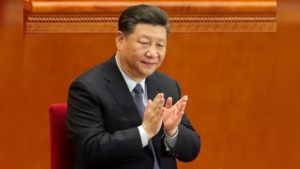
Government grapples with conflicting pressures from East and West.
- CNL Reporter
- April 20, 2025
- Weekly Political Review
- Weekly Political review
- 0 Comments
Weekly Political Review
Wide Angle focuses on Global Probes, Chinese Deals, and Geopolitical Dilemmas
By Rohana Jith
A nation still haunted by the 2019 Easter Sunday bombings now finds itself navigating another kind of turmoil—one that spans economic rescue, strategic alliances, and public trust in national security narratives. Recent developments on two fronts have thrust Sri Lanka back into international headlines: fresh confirmations from global investigations on the nature and origin of the Easter attacks, and China’s sweeping new economic overtures to the island nation.
Easter Sunday Attacks: Reinforced Global Findings

On April 21, 2019, a series of coordinated suicide bombings ripped through churches and hotels in Colombo and Batticaloa, killing 269 people and injuring over 500. The attack, perpetrated by local Islamist extremists, remains the deadliest terrorist strike in Sri Lanka’s post-war history.
In response, Sri Lanka sought international assistance for the investigation. Agencies including the FBI (United States), Scotland Yard (UK), Mossad (Israel), Australian Federal Police, and Interpol collaborated with the Criminal Investigation Department (CID) under then-Senior DIG Ravi Seneviratne and SSP Shani Abeysekera.
Key Findings:
All agencies agreed: the attackers were local Islamist extremists with ideological and operational links to ISIS.
The plot’s mastermind, Zahran Hashim, had established communications with Islamic State operatives and shared propaganda aligned with global jihadist ideology.

No foreign governments or intelligence agencies were found to be involved in the planning or execution of the attacks.
Despite these consistent findings, recent local claims—such as the alleged involvement of politician Sivanesathurai Chandrakanthan (alias Pillayan)—have stirred political and public controversy. These assertions, lacking corroboration from global agencies, threaten to undermine the legitimacy of earlier investigative conclusions.
One CID source emphasized:“The data, devices, and interviews were all reviewed by top global investigators. The evidence pointed only toward ISIS-backed extremism.”
China’s Billion-Dollar Bailout: Lifeline or Leverage?
While grappling with unresolved questions from its recent past, Sri Lanka is also contending with a fragile economic future—one that China appears keen to shape.
In late 2023, Beijing announced a $12 billion debt relief package for Sri Lanka, marking its largest-ever financial rescue for any single country. The move came at a critical juncture: Sri Lanka needed creditor approval to unlock a stalled $2.9 billion IMF bailout.
What the Package Includes:$7 billion in nominal debt write-offs,Deferred interest and extended grace periods on Chinese and other bilateral loans,Approval to restructure Chinese commercial debt under similar terms to other creditors
Uniquely, China’s deal lacked the usual political or governance conditions seen in Western aid packages. There were no explicit demands for port leases, military base access, or market reforms.
A former finance official noted:“China asked for no political promises—just that Sri Lanka fulfill its own laws and keep communication lines open.”
This “no-strings-attached” approach starkly contrasts with the Paris Club creditors and multilateral institutions that often tie aid to structural reforms and democratic benchmarks.
Diplomatic Chess: Strategic Proposals from Beijing
Following the bailout, diplomatic sources confirmed that President Xi Jinping held a discreet meeting with a group of Asian envoys, including Sri Lanka’s ambassador to Beijing. A private proposal was subsequently dispatched to Sri Lanka’s new administration under President Anura Kumara Dissanayake.

While the contents remain under wraps, informed leaks suggest China proposed:A South Asian trade corridor to counter Western tariff regimes,New investments in logistics and infrastructure and Strategic neutrality assurances, especially regarding naval operations in the Indian Ocean
This proposal landed amid heightened tensions over China’s maritime ambitions. Beijing has expressed dissatisfaction over Sri Lanka’s India-backed naval access clause, which reportedly allows India to review third-party naval visits to Sri Lankan ports.
The EU, UK, and Global Watchdogs Push Back
As Sri Lanka leans into Chinese economic cooperation, it risks friction with traditional Western partners. The European Union has hinted at revoking the GSP+ trade concession, which supports billions in garment exports.
The UK Labour Party, widely expected to win the next general election, has vowed to support UNHRC resolutions demanding justice and accountability in Sri Lanka. International watchdogs are also demanding:

These are Repeal of the Prevention of Terrorism Act (PTA), and Amendments to the Online Safety Act, citing free speech concerns, These pressures highlight the cost of drifting from Western-aligned governance and legal reforms.
India, reacting strongly to China’s growing regional ties, included a clause in a recent security pact with Sri Lanka restricting Chinese vessel entry. Despite President Anura Kumara Dissanayake’s promise to lift the ban during his visit to China, the restrictions remain, straining Beijing-Colombo ties. China’s recent regional visits and new trade agreements with Pakistan and Bangladesh reflect an assertive diplomatic push—one that India perceives as hostile, especially after suspending key shipping routes to Bangladesh.

Domestic Politics: JVP’s Gamble Domestically, the JVP aims to secure over 50% in local elections to solidify its political standing. Despite past electoral successes, internal divisions with its former ally, the Compass group, have weakened grassroots campaigning. Only a few dedicated JVP activists remain visible, highlighting the challenges facing the party’s mobilization strategy.

